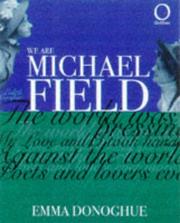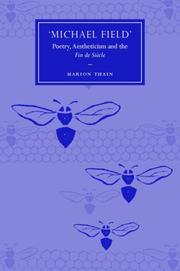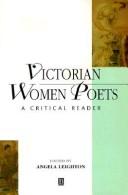| Listing 1 - 10 of 12 | << page >> |
Sort by
|
Book
ISBN: 9780907404095 090740409X Year: 2006 Publisher: Bury St. Edmunds Blackland
Abstract | Keywords | Export | Availability | Bookmark
 Loading...
Loading...Choose an application
- Reference Manager
- EndNote
- RefWorks (Direct export to RefWorks)
Multi
ISBN: 9781474448413 9781474448390 Year: 2023 Publisher: Edinburgh Edinburgh University Press
Abstract | Keywords | Export | Availability | Bookmark
 Loading...
Loading...Choose an application
- Reference Manager
- EndNote
- RefWorks (Direct export to RefWorks)
All authors try to do something new, or tell an old story in a new way; but for Katharine Bradley and Edith Cooper, who wrote as Michael Field and called themselves 'Poets and Lovers', rewriting old stories, history and traditional literary forms with extraordinary innovation was nothing short of high art. Offering new readings of a wide range of Michael Field texts, this book asks: how do ambitious experiments with a joint diary, closet drama, ekphrasis, elegy and nature, devotional and love poetry help these women navigate the paradox of looking backward in order to achieve their goal 'to make all things new'? How do their revisionary poetics help the co-authors, as queer, female Aesthetes, cope with late-Victorian modernity? Through an interdisciplinary approach to their passionate and sometimes eccentric life and work, this book provokes thought about the fin-de-siècle and invites readers, like Michael Field themselves, to engage the past in order to create transtemporal community and to make sense of the present. Examines history, modernity, gender, and sexuality through the literary innovations of two late-Victorian female co-authorsOffers new readings of a wide range of Michael Field texts (Callirrhoë, Fair Rosamund, Canute the Great, Long Ago, Sight and Song, Underneath the Bough, Wild Honey, Poems of Adoration, Mystic Trees, Whym Chow, the joint diary Works and Days and many unpublished poems)Uses interdisciplinary methods to bring Michael Field's life and work in conversation with queer and feminist approaches to literary form, art history, ecocriticism, disability studies and religious studiesIdentifies the literary, visual, and philosophical precursors of Michael Field's adaptations and proposes that we read their appropriations as a deliberate blend of objective and subjective epistemologiesTraces resonances between fin-de-siècle culture and today's theoretical debates about historicist vs. presentist approaches to the archive and Foucauldian vs. phenomenological understandings of subjectivity, gender and sexualitySituates Michael Field in relation to literary texts and philosophical thought of their contemporaries-the late Victorians and Decadent Moderns with whom they bridge the nineteenth and twentieth centuriesAll authors try to do something new, or tell an old story in a new way; but for Katharine Bradley and Edith Cooper, who wrote as Michael Field and called themselves 'Poets and Lovers', rewriting old stories, history and traditional literary forms with extraordinary innovation was nothing short of high art. Offering new readings of a wide range of Michael Field texts, this book asks: how do ambitious experiments with a joint diary, closet drama, ekphrasis, elegy and nature, devotional and love poetry help these women navigate the paradox of looking backward in order to achieve their goal 'to make all things new'? How do their revisionary poetics help the co-authors, as queer, female Aesthetes, cope with late-Victorian modernity? Through an interdisciplinary approach to their passionate and sometimes eccentric life and work, this book provokes thought about the fin-de-siècle and invites readers, like Michael Field themselves, to engage the past in order to create transtemporal community and to make sense of the present.
Book
ISBN: 9781474448413 9781474448390 Year: 2023 Publisher: Edinburgh : Edinburgh University Press,
Abstract | Keywords | Export | Availability | Bookmark
 Loading...
Loading...Choose an application
- Reference Manager
- EndNote
- RefWorks (Direct export to RefWorks)
All authors try to do something new, or tell an old story in a new way; but for Katharine Bradley and Edith Cooper, who wrote as Michael Field and called themselves 'Poets and Lovers', rewriting old stories, history and traditional literary forms with extraordinary innovation was nothing short of high art. Offering new readings of a wide range of Michael Field texts, this book asks: how do ambitious experiments with a joint diary, closet drama, ekphrasis, elegy and nature, devotional and love poetry help these women navigate the paradox of looking backward in order to achieve their goal 'to make all things new'? How do their revisionary poetics help the co-authors, as queer, female Aesthetes, cope with late-Victorian modernity? Through an interdisciplinary approach to their passionate and sometimes eccentric life and work, this book provokes thought about the fin-de-siècle and invites readers, like Michael Field themselves, to engage the past in order to create transtemporal community and to make sense of the present. Examines history, modernity, gender, and sexuality through the literary innovations of two late-Victorian female co-authorsOffers new readings of a wide range of Michael Field texts (Callirrhoë, Fair Rosamund, Canute the Great, Long Ago, Sight and Song, Underneath the Bough, Wild Honey, Poems of Adoration, Mystic Trees, Whym Chow, the joint diary Works and Days and many unpublished poems)Uses interdisciplinary methods to bring Michael Field's life and work in conversation with queer and feminist approaches to literary form, art history, ecocriticism, disability studies and religious studiesIdentifies the literary, visual, and philosophical precursors of Michael Field's adaptations and proposes that we read their appropriations as a deliberate blend of objective and subjective epistemologiesTraces resonances between fin-de-siècle culture and today's theoretical debates about historicist vs. presentist approaches to the archive and Foucauldian vs. phenomenological understandings of subjectivity, gender and sexualitySituates Michael Field in relation to literary texts and philosophical thought of their contemporaries-the late Victorians and Decadent Moderns with whom they bridge the nineteenth and twentieth centuriesAll authors try to do something new, or tell an old story in a new way; but for Katharine Bradley and Edith Cooper, who wrote as Michael Field and called themselves 'Poets and Lovers', rewriting old stories, history and traditional literary forms with extraordinary innovation was nothing short of high art. Offering new readings of a wide range of Michael Field texts, this book asks: how do ambitious experiments with a joint diary, closet drama, ekphrasis, elegy and nature, devotional and love poetry help these women navigate the paradox of looking backward in order to achieve their goal 'to make all things new'? How do their revisionary poetics help the co-authors, as queer, female Aesthetes, cope with late-Victorian modernity? Through an interdisciplinary approach to their passionate and sometimes eccentric life and work, this book provokes thought about the fin-de-siècle and invites readers, like Michael Field themselves, to engage the past in order to create transtemporal community and to make sense of the present.
Field, Michael --- LITERARY CRITICISM / Feminist. --- Criticism and interpretation.
Book
ISBN: 0821446924 Year: 2019 Publisher: Athens, Ohio : Ohio University Press,
Abstract | Keywords | Export | Availability | Bookmark
 Loading...
Loading...Choose an application
- Reference Manager
- EndNote
- RefWorks (Direct export to RefWorks)
"In the last twenty years, Michael Field has emerged as one of the most fascinating poets of the Victorian era. Through their collaborative partnership as "Michael Field," Katharine Bradley and Edith Cooper engaged in the aesthetic and decadent movements of the fin de siecle, while their poetry and verse drama articulate ideas associated with the New Woman and boldly express queer and lesbian desire. Michael Field: Decadent Moderns extends the focus on these key literary and cultural contexts by emphasizing their continuing significance within twentieth-century literary modernism. Through a series of interdisciplinary essays, this book addresses Michael Field's energetic engagements with a range of topics including ecology, perfume, tourism, art history, sculpture, formalism, classics, and book history. In doing so, Michael Field: Decadent Moderns highlights the modernity, radicalism, and relevance of their work, both within the nineteenth and twentieth centuries as well as in our own cultural moment"--
Lesbianism in literature. --- Desire in literature. --- Poetry, Modern --- Lesbians' writings --- Themes, motives. --- History and criticism. --- Field, Michael --- Criticism and interpretation.

ISBN: 1899791663 Year: 1998 Publisher: Bath Absolute Press
Abstract | Keywords | Export | Availability | Bookmark
 Loading...
Loading...Choose an application
- Reference Manager
- EndNote
- RefWorks (Direct export to RefWorks)
Thematology --- Field, Michael --- anno 1800-1899 --- Great Britain --- Bradley, Katherine Harris --- Cooper, Edith Emma --- Authors, English --- Authorship --- Lesbians --- Women authors, English --- Collaboration. --- Writers --- Biographical details --- Book
Digital
ISBN: 9781137566140 Year: 2016 Publisher: New York Palgrave Macmillan US :Imprint: Palgrave Macmillan
Abstract | Keywords | Export | Availability | Bookmark
 Loading...
Loading...Choose an application
- Reference Manager
- EndNote
- RefWorks (Direct export to RefWorks)
This book shows how British women writers' encounters with textual and visual representations of ancient Egyptian women such as Hathor, Isis, and Cleopatra influenced how British women represented their own desired emancipation in novels, poetry, drama, romances, and fictional treatises. Molly Youngkin argues that canonical women writers such as Florence Nightingale and George Eliot—and less canonical figures such as Katharine Bradley and Edith Cooper (who wrote under the name 'Michael Field') and Elinor Glyn—incorporated their knowledge of ancient Egyptian women's cultural power in only a limited fashion when presenting their visions for emancipation. Often, they represented ancient Greek women or Italian Renaissance women rather than ancient Egyptian women, since Greek and Italian cultures were more familiar and less threatening to their British audience. This notable distinction opens up discussions about the history of British women, their writing, and the British view on gender in the nineteenth and early twentieth centuries.
Science --- wetenschap --- vrouwen --- wetenschappen --- English literature: authors --- Glyn, Elinor --- Cleopatra VII --- Nightingale, Florence --- Eliot, George --- Field, Michael --- Antiquity --- anno 1800-1899 --- anno 1900-1909 --- anno 1910-1919 --- Egypt

ISBN: 9780511484933 9780521874182 9780521147736 9780511355561 0511355564 9786611153342 6611153349 1107181542 1281153346 1139132822 0511355041 0511354495 051135391X 0511484933 0521874181 0521147735 Year: 2007 Publisher: Cambridge ; New York : Cambridge University Press,
Abstract | Keywords | Export | Availability | Bookmark
 Loading...
Loading...Choose an application
- Reference Manager
- EndNote
- RefWorks (Direct export to RefWorks)
'Michael Field' (1884-1914) was the pseudonym of two women, the aunt and niece Katharine Bradley and Edith Cooper, who lived and wrote together as 'lovers'. The large oeuvre contains poems, dramas, and a vast diary. Marion Thain recounts the development of a fascinating and idiosyncratic poetic persona, which became a self-reflexive study in aestheticism. The constructed life and work of 'Michael Field' is used here to deepen and complicate our understanding of many of the most distinctive aesthetic debates of the late nineteenth and early twentieth centuries; a process unified by the recurring engagement with theories of time and history that structures this book. This analysis of poetry, aestheticism and the fin de siècle, through the performance of 'Michael Field', has implications that reach far beyond an understanding of one poet's work. Scholars of both Victorian and modernist literature will learn much from this innovative and compelling study.
Aestheticism (Literature) --- Decadence (Literary movement) --- Literary movements --- Literature, Modern --- History and criticism --- Field, Michael --- Bradley, Katharine Harris, --- Cooper, Edith Emma, --- Leigh, Isla, --- Bradley, Katherine Harris, --- Leigh, Arran, --- Author of Borgia --- Borgia, Author of --- Criticism and interpretation. --- Arts and Humanities --- Literature
Book
ISBN: 3030861252 3030861260 Year: 2021 Publisher: Cham, Switzerland : Springer,
Abstract | Keywords | Export | Availability | Bookmark
 Loading...
Loading...Choose an application
- Reference Manager
- EndNote
- RefWorks (Direct export to RefWorks)
English literature. --- Literary theory. --- Field, Michael --- Criticism and interpretation. --- British literature --- Inklings (Group of writers) --- Nonsense Club (Group of writers) --- Order of the Fancy (Group of writers) --- Author of Borgia --- Borgia, Author of --- Bradley, Katharine Harris, --- Cooper, Edith Emma,
Book
ISBN: 0691255903 069120800X 0691208115 Year: 2024 Publisher: Princeton, New Jersey : Princeton University Press,
Abstract | Keywords | Export | Availability | Bookmark
 Loading...
Loading...Choose an application
- Reference Manager
- EndNote
- RefWorks (Direct export to RefWorks)
The first book-length selection from the extraordinary unpublished diary of the late-Victorian writer "Michael Field"-the pen name of two female coauthors and romantic partnersMichael Field was known to late-Victorian readers as a superb poet and playwright-until Robert Browning let slip Field's secret identity: in fact, "Michael Field" was a pseudonym for Katharine Bradley (1846-1914) and Edith Cooper (1862-1913), who were lovers, a devoted couple, and aunt and niece. For thirty years, they kept a joint diary titled Works and Days that eventually reached almost 10,000 pages. One Soul We Divided is the first critical edition of selections from this remarkable unpublished work.A fascinating personal and literary experiment, the diary tells the extraordinary story of the love, art, ambitions, and domestic life of a queer couple in fin de siècle London. It also tells vivid firsthand stories of the literary and artistic worlds Bradley and Cooper inhabited and of their encounters with such celebrities as Browning, Oscar Wilde, W. B. Yeats, Aubrey Beardsley, and Bernard Berenson. Carolyn Dever provides essential context, including explanatory notes, a cast of characters, a family tree, and a timeline.An unforgettable portrait of two writers and their unexpected romantic, literary, and artistic marriage, One Soul We Divided rewrites what we think we know about Victorian women, intimacy, and sexuality.
Authors, English --- Lesbians --- Carolyn Dever. --- Catholic. --- Diary. --- Dog. --- English. --- Incest. --- Lesbian. --- Modernism. --- One Soul We Divided: A Critical Edition of the Diary of Michael Field. --- Poet. --- Poetry. --- Princeton University Press. --- Private. --- Victorian. --- Women. --- Field, Michael --- Bradley, Katharine Harris,

ISBN: 0631197575 Year: 1996 Publisher: Oxford Blackwell
Abstract | Keywords | Export | Availability | Bookmark
 Loading...
Loading...Choose an application
- Reference Manager
- EndNote
- RefWorks (Direct export to RefWorks)
Deze reader bevat 17 essays over en geïnspireerd door het werk van Victoriaanse dichteressen. De artikelen onderzoeken o.a. het beeld van de gevallen vrouw, van de moeder en de muze in de poëzie van deze vrouwen. Dit boek biedt daarnaast ook een frissen kijk op de vele debatten over interpretatie, biografie en de canon.
English poetry --- Women and literature --- Women authors --- History and criticism. --- History --- Literature --- Eliot, George --- Rossetti, Christina Georgina --- Hemans, Felicia --- Field, Michael --- Browning, Elizabeth Barrett --- anno 1800-1899 --- Great Britain --- Brontë, Emily Jane --- Watson, Rosamund Marriott --- Coleridge, Mary E. --- History and criticism --- 19th century --- English poetry - Women authors - History and criticism. --- Procter, Adelaide Anne --- English literature --- Women authors&delete& --- Rossetti, Christina --- Brontë, Emily --- Poetry --- Book
| Listing 1 - 10 of 12 | << page >> |
Sort by
|

 Search
Search Feedback
Feedback About UniCat
About UniCat  Help
Help News
News